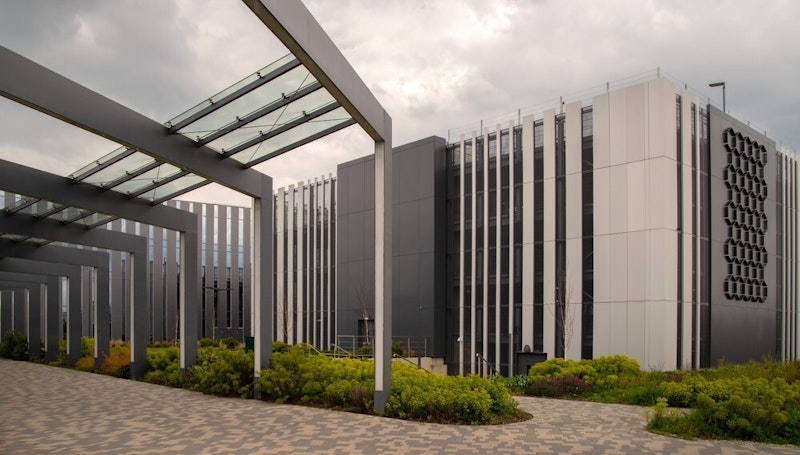Study Notes
GCSE Geography | Post-industrial UK (UK Economic Futures 4)
- Level:
- GCSE
- Board:
- AQA, Edexcel, OCR, Eduqas
Last updated 6 Jan 2025
In recent decades the UK has moved to a post-industrial economy. But what does a shift towards a post-industrial economy mean?
A post-industrial economy is one where the traditional industrial base of manufacturing has been replaced by a rapidly growing service sector and research and development. As the economy develops the demand for services grows as wealthier people are willing to pay for more goods and services.
Deindustrialisation happened in the UK from the 1970s onwards. In the 1950s over half of UK workers were employed in manufacturing, but by 2020 this figure had dropped to less than 15%. In the same period the percentage of UK workers employed in the service sector has grown from 40% to just over 75%. Finance is an important part of the service sector, including banking, insurance, securities dealing and fund management, and employs around 2 million people in the UK, generating about 10% of UK GDP.
During the same period the quaternary sector has also grown significantly. In the 1950s less than 1% of people worked in the research and development industries - this now accounts for 10% of UK workers.

Information technology
IT has played a vital role in the shift to a post-industrial economy and has changed how we live and work in recent decades.
Computers are key to every aspect of our lives - they store huge amounts of data that can be accessed in an instant, and when they don't work it causes repercussions right across the country. For example in July 2024 a faulty software update affected Microsoft Windows and caused a massive IT outage for businesses, banks, health services and airlines - in the UK doctors were unable to access patient records and many operations had to be postponed, and 4000 flights were cancelled or delayed, leaving passengers stranded. This global chaos highlights how dependent we are on technology and therefore really vulnerable when a glitch occurs.
The internet has revolutionised how we communicate - we can talk face-to-face with people instantly on the other side of the world through high-speed broadband and video conferencing software (see image below), and has transformed how we access services with most of us using our smart phones to shop, bank, sort insurance, book medical appointments, etc.
IT has also enabled many of us to work from home, which saves businesses huge amount of money - there is less need for expensive office space and workers tend to be more productive at home as there are less distractions. During the Covid pandemic there was a big shift to home-working, which was so successful that many companies still prefer this way of working today. IT also enables students to access support for their learning at home - students are far more reliant on online videos and revision sessions than the notes they have made whilst studying whatever qualification they are revising for.
Developments in IT have also meant that many new businesses have developed, such as manufacturing hardware and designing software – and over 1.3 million people work in the IT sector in the UK.

Research and development
As the UK economy has become more advanced it has been able to invest in quaternary industries. The research sector is an important part of this. It is high-tech and highly skilled, and provides jobs for over 60,000 well-qualified people in areas like biotechnology, engineering and pharmaceuticals.
Research is done in universities, as well as by private companies and government bodies. It brings in £3 billion a year and is likely to be one of the UK economy’s main growth areas in the future.

Science and business parks
Science and business parks are an important features of the post-industrial economy...
Science parks
A science park is a group of scientific and technical knowledge-based businesses located on a single site. Usually associated with universities so they can take advantage of research facilities and a pool of skilled graduates. Located in attractive environments but close to transport links. There are over one hundred science parks in the UK, with around 75 000 people working in them. The UK's first science park opened on the outskirts of Cambridge in 1970 - it was set up by Trinity College which is part of the University of Cambridge. It has expanded greatly since then and is home to numerous science and technology related businesses (see image below).
Business parks
A business park is an area of land on the edge of town occupied by a cluster of businesses.
Business parks are usually located on the edges of towns because:
- Land tends to be cheaper than in town centres
- With more land available, it may be possible to extend businesses
- Access is better for workers and distribution, using by-passes and motorways, with less traffic congestion than in towns or cities
Also by being part of a cluster, businesses can benefit by working together to create economies of scale, where by running costs fall.

You might also like
Changing Places - A-Level MCQ Quiz
Quizzes & Activities

Ghost Town - a fantastic representation of place
11th January 2023
Daily Email Updates
Subscribe to our daily digest and get the day’s content delivered fresh to your inbox every morning at 7am.
Signup for emails